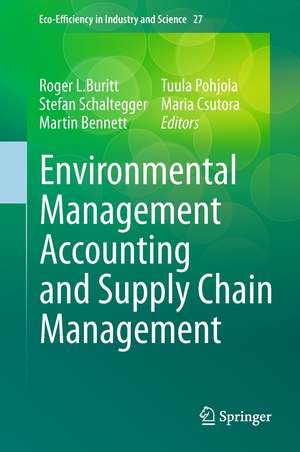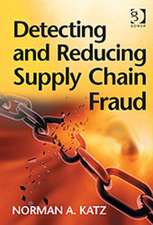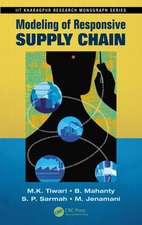Environmental Management Accounting and Supply Chain Management: Eco-Efficiency in Industry and Science, cartea 27
Editat de Roger L. Burritt, Stefan Schaltegger, Martin Bennett, Tuula Pohjola, Maria Csutoraen Limba Engleză Paperback – 15 iul 2013
| Toate formatele și edițiile | Preț | Express |
|---|---|---|
| Paperback (1) | 1222.01 lei 6-8 săpt. | |
| SPRINGER NETHERLANDS – 15 iul 2013 | 1222.01 lei 6-8 săpt. | |
| Hardback (1) | 1225.94 lei 6-8 săpt. | |
| SPRINGER NETHERLANDS – 21 mai 2011 | 1225.94 lei 6-8 săpt. |
Din seria Eco-Efficiency in Industry and Science
- 9%
 Preț: 901.52 lei
Preț: 901.52 lei - 18%
 Preț: 951.29 lei
Preț: 951.29 lei - 15%
 Preț: 640.24 lei
Preț: 640.24 lei - 15%
 Preț: 654.77 lei
Preț: 654.77 lei - 15%
 Preț: 648.42 lei
Preț: 648.42 lei -
 Preț: 391.61 lei
Preț: 391.61 lei - 15%
 Preț: 642.51 lei
Preț: 642.51 lei - 15%
 Preț: 643.34 lei
Preț: 643.34 lei - 18%
 Preț: 957.62 lei
Preț: 957.62 lei - 18%
 Preț: 953.35 lei
Preț: 953.35 lei - 18%
 Preț: 1238.74 lei
Preț: 1238.74 lei - 18%
 Preț: 1224.68 lei
Preț: 1224.68 lei - 18%
 Preț: 963.15 lei
Preț: 963.15 lei - 18%
 Preț: 2115.07 lei
Preț: 2115.07 lei - 18%
 Preț: 1388.53 lei
Preț: 1388.53 lei - 18%
 Preț: 1861.27 lei
Preț: 1861.27 lei - 18%
 Preț: 1234.94 lei
Preț: 1234.94 lei - 15%
 Preț: 643.00 lei
Preț: 643.00 lei - 15%
 Preț: 647.40 lei
Preț: 647.40 lei - 15%
 Preț: 637.59 lei
Preț: 637.59 lei - 15%
 Preț: 648.42 lei
Preț: 648.42 lei - 15%
 Preț: 646.62 lei
Preț: 646.62 lei - 15%
 Preț: 645.79 lei
Preț: 645.79 lei - 20%
 Preț: 590.94 lei
Preț: 590.94 lei
Preț: 1222.01 lei
Preț vechi: 1490.25 lei
-18% Nou
Puncte Express: 1833
Preț estimativ în valută:
233.85€ • 242.77$ • 195.00£
233.85€ • 242.77$ • 195.00£
Carte tipărită la comandă
Livrare economică 22 martie-05 aprilie
Preluare comenzi: 021 569.72.76
Specificații
ISBN-13: 9789400736207
ISBN-10: 9400736207
Pagini: 400
Ilustrații: XXII, 378 p.
Dimensiuni: 155 x 235 x 21 mm
Greutate: 0.57 kg
Ediția:2011
Editura: SPRINGER NETHERLANDS
Colecția Springer
Seria Eco-Efficiency in Industry and Science
Locul publicării:Dordrecht, Netherlands
ISBN-10: 9400736207
Pagini: 400
Ilustrații: XXII, 378 p.
Dimensiuni: 155 x 235 x 21 mm
Greutate: 0.57 kg
Ediția:2011
Editura: SPRINGER NETHERLANDS
Colecția Springer
Seria Eco-Efficiency in Industry and Science
Locul publicării:Dordrecht, Netherlands
Public țintă
GraduateCuprins
Foreword
Preface
Acknowledgments
List of Contributors
List of Figures
List of Tables
PART I: Introduction and Structure
1. Sustainable Supply Chain Management and Environmental Management Accounting
Part II: Contemporary Issues
2. Life Cycle and Supply Chain Information in Environmental Management Accounting: A Coffee Case Study
3. Motivations Behind Sustainable Purchasing
4. An Input-output Technological Model of Life Cycle Costing
5. Farm Risk Management Applied to Sustainability of the Food Supply Chain: A Case Study of Sustainability Risks in Dairy Farming
J. Leppälä, E. Manninen and T. Pohjola
PART III: Social Issues
6. Companies, Stakeholders and Corporate Sustainability - Empirical Insights from Hungary
7. Corporate Social Responsibility and Competitiveness - Empirical Results and Future Challenges
8. Social Impact Measurement: A Classification of Methods
PART IV: Economic Issues
9. New Decision Method for Environmental Capital Investment
N. Minato
10. Carbon Accounting in Greek Companies Participating in the European Union’s Emissions Trading Scheme: Current Practice and Projected Financial Implications
11. Environmental Management Accounting: Comparing and Linking Requirements on the Micro and Macro Level - A Practitioner’s View
PART V: Other Issues
12. The Benefit Side of Environmental Activities and the Connection with Company Value
13. Implementation of Water Framework Directive Obligations in Hungary: Estimating Benefits of Development Activities in Two Pilot Areas
14. Health, Safety and Environmental Costs and Chemical Selection in the Oilfield Industry: A Method for InformedDecisions During Project Planning
15. Sustainability Management Control
16. Impact Assessment in the European Union: The Example of the Registration, Evaluation and Authorisation of Chemicals (REACH)
Index
Preface
Acknowledgments
List of Contributors
List of Figures
List of Tables
PART I: Introduction and Structure
1. Sustainable Supply Chain Management and Environmental Management Accounting
Part II: Contemporary Issues
2. Life Cycle and Supply Chain Information in Environmental Management Accounting: A Coffee Case Study
3. Motivations Behind Sustainable Purchasing
4. An Input-output Technological Model of Life Cycle Costing
5. Farm Risk Management Applied to Sustainability of the Food Supply Chain: A Case Study of Sustainability Risks in Dairy Farming
J. Leppälä, E. Manninen and T. Pohjola
PART III: Social Issues
6. Companies, Stakeholders and Corporate Sustainability - Empirical Insights from Hungary
7. Corporate Social Responsibility and Competitiveness - Empirical Results and Future Challenges
8. Social Impact Measurement: A Classification of Methods
PART IV: Economic Issues
9. New Decision Method for Environmental Capital Investment
N. Minato
10. Carbon Accounting in Greek Companies Participating in the European Union’s Emissions Trading Scheme: Current Practice and Projected Financial Implications
11. Environmental Management Accounting: Comparing and Linking Requirements on the Micro and Macro Level - A Practitioner’s View
PART V: Other Issues
12. The Benefit Side of Environmental Activities and the Connection with Company Value
13. Implementation of Water Framework Directive Obligations in Hungary: Estimating Benefits of Development Activities in Two Pilot Areas
14. Health, Safety and Environmental Costs and Chemical Selection in the Oilfield Industry: A Method for InformedDecisions During Project Planning
15. Sustainability Management Control
16. Impact Assessment in the European Union: The Example of the Registration, Evaluation and Authorisation of Chemicals (REACH)
Index
Textul de pe ultima copertă
Ongoing concern about the need to promote environmental management accounting has resulted in this, the fifth volume in the Environmental and Sustainability Management Accounting Network (EMAN) series. Drawing inspiration from the 2007 EMAN conference in Finland on the links between environmental management accounting and supply chain administration, the book includes a number of research papers presented there as well as several independent contributions that represent a range of perspectives on the topic.
This volume’s focus on the environmental accounting of supply chain processes is of particular relevance because these processes supply data about the environmental impact of relationships between business organisations, an area where the boundary separating internal and external accounting is ill-defined. Here, contributors advocate what they term ‘accounting for cooperation’ as a more environmentally positive complement to the paradigmatic practice of ‘accounting for competition’.
In addition to analyzing the supply chain, a number of chapters are based on papers presented to the EMAN-EU conference on sustainability and corporate social responsibility accounting, held in Hungary in 2008. Corporate social responsibility accounting is also a boundary-spanning function requiring awareness of the interface between an organisation’s internal accounting, and that which has an external function through its social responsibility to different groupings.
Finally, in acknowledgement of growing international engagement with environmental management accounting following the introduction of international guidelines in 2005, the book includes papers fromthe first EMAN Global conference on integrated environmental management accounting for sustainable development held in South Africa in 2007.
This publication is required reading for anyone wanting to keep abreast of the latest developments in this field. Readers should also visit EMAN’s website at http://www.eman-global.net.
This volume’s focus on the environmental accounting of supply chain processes is of particular relevance because these processes supply data about the environmental impact of relationships between business organisations, an area where the boundary separating internal and external accounting is ill-defined. Here, contributors advocate what they term ‘accounting for cooperation’ as a more environmentally positive complement to the paradigmatic practice of ‘accounting for competition’.
In addition to analyzing the supply chain, a number of chapters are based on papers presented to the EMAN-EU conference on sustainability and corporate social responsibility accounting, held in Hungary in 2008. Corporate social responsibility accounting is also a boundary-spanning function requiring awareness of the interface between an organisation’s internal accounting, and that which has an external function through its social responsibility to different groupings.
Finally, in acknowledgement of growing international engagement with environmental management accounting following the introduction of international guidelines in 2005, the book includes papers fromthe first EMAN Global conference on integrated environmental management accounting for sustainable development held in South Africa in 2007.
This publication is required reading for anyone wanting to keep abreast of the latest developments in this field. Readers should also visit EMAN’s website at http://www.eman-global.net.
Caracteristici
Provides latest research in environmental management accounting; Addresses supply chain management issues which are of growing global significance; Includes papers presented during the first EMAN global conference in South Africa in 2007 and the EMAN-EU conference held in Hungary 2008 Includes supplementary material: sn.pub/extras










